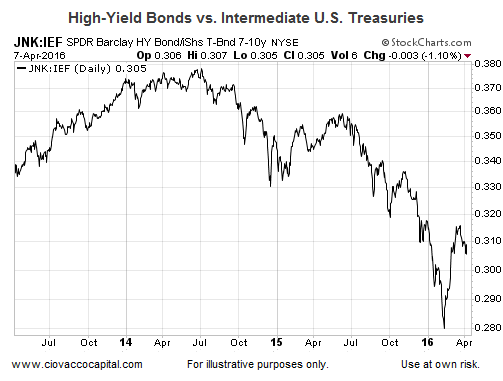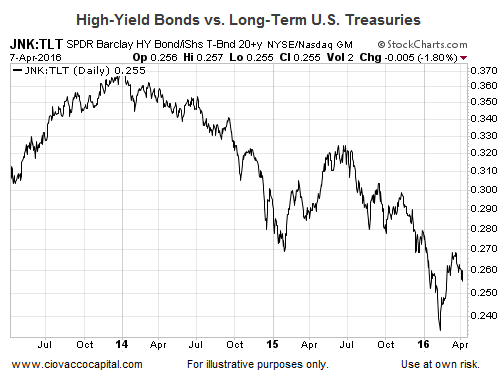Yield vs. Safety Of Principal
If an investor was given the opportunity to invest in two nearly identical bonds with one bond paying 2% per year and the other paying 6% per year, logic says most would choose to invest in the higher-yielding bond. In the real world, the bond paying 6% also comes with a higher risk of default. Therefore, when investors start to become more concerned about the economy and rising bond default rates, they tend to gravitate toward lower-yielding and safer bond ETFs, such as iShares 7-10 Year Treasury Bond (NYSE:IEF), relative to higher yielding alternatives, such as SPDR Barclays (LON:BARC) High Yield Bond (NYSE:JNK). The chart below shows the performance of JNK relative to IEF. The chart reflects a bias toward return of principal over yield.

Some cracks have started to appear in the credit markets in 2016. From CNBC:
The default rate for high-yield bonds has risen to the highest level in six years, and a top bond analyst sees more bad news ahead for investors in so-called junk bonds….Defaults are only likely to increase over the rest of the year, predicts Diane Vazza, S&P’s head of global fixed income research.
The concepts illustrated on the chart below are described in this video clip.

Potential Problems In The Oil Patch
Longer-term, if the economy flipped into a recession, the bulk of the defaults could come from the energy sector. From Bloomberg:
Wall Street’s biggest banks need to set aside more cash to cover losses as low oil prices take their toll, according to Moody’s Investors Service. Goldman Sachs Group Inc (NYSE:GS)., Morgan Stanley (NYSE:MS), JPMorgan Chase & Co (NYSE:JPM)., Bank of America Corp (NYSE:BAC). and Citigroup Inc (NYSE:C). would need an additional $9 billion to cover souring oil and gas loans in the worst-case scenario, the ratings firm said Thursday in a report.
Increased Stress In China’s Bond Market
When U.S. stocks sold off early in 2016, one of the market’s principal concerns was the health of China’s economy. Those concerns could resurface in the coming months. From Bloomberg:
Chinese companies canceled more than double the amount of bond offerings in March compared with a year earlier, as mounting defaults increased financing costs…The surge in scrapped offerings reflects investors’ growing concern about default risks amid the worst slowdown in a quarter century.
As China looks to shift to a more internally driven consumer economy, it is possible some companies will not survive the transition. From Bloomberg:
China’s top corporate bond underwriter said defaults will increase this year, casting a cloud over the market after record offerings in the first quarter helped refinance debt…”There will probably be many credit events caused by liquidity problems,” said Huang Ling at the Beijing-based firm, which Bloomberg-compiled data show underwrote the most corporate bonds excluding notes regulated by the central bank in the first three months. “Some external events may trigger withdrawal of lending by financial institutions.”
